Here’s What John Oliver Has To Say About Charter Schools
In John Oliver’s episode on charter schools, he did what he does best — systematically deconstruct a vexed and complex issue without coming off as sanctimonious or boring. Fraud, inefficiency, and rampant closures have dogged charter schools for far too long. And even as an alarming number of recent news reports by small and regional publications have made light of this, politicians and the mainstream news media have scarcely blinked.
What’s fascinating about Oliver’s brand of muckraking, crusading comedy is that he is able to illuminate the deeper nuances of the story in a way that few journalists can. Over the years, we’ve been trying to do the same.
We’ve worked with charter schools for several years now. We’ve consulted educationists, met with key stakeholders, and thought long and hard about the problems that ail the charter school system. About a year ago, we made our own diagnosis and identified why charter schools were failing.
For quick reading, we’ve condensed our diagnosis into four crucial reasons.
Why charter schools are failing
1. Rampant credit card spending
As with any other company, teachers and staffers make school-related purchases using credit cards. The charter school’s management are unable to keep a line-by-line track of credit card statements. And it’s unrealistic to expect them to. With no rigorous system to keep credit card spends in check, it’s not surprising that fraud and embezzlement have become such problems in charter schools.
2. No purchase orders
Purchase orders (POs) are documents that are sent from the buyer to the seller, detailing the specifications of the product so ordered. When organizations scale up, the purchase order becomes absolutely essential. When the seller issues an invoice of a particular product, the organization’s finance team can check the PO to ascertain if the specifications mentioned in the invoice match the specifications outlined in the PO.
In other words, the PO makes sure that the product delivered actually meets the organization’s expectations. More importantly, without a PO, there’s no way to know if the invoice is actually even legitimate. Some questionable seller can send the charter school an invoice for a product and there would be no way to establish if someone from the organization actually purchased the product.
3. No approval system
What this essentially means is that teachers can place orders without checking with the school management first. We needn’t explain why this would be a problem. But, there’s also an opportunity cost involved. Teachers aren’t procurement officers, they do not have the time or expertise to get the best bang for the buck.
4. No real-time spend recognition
In the absence of an approval system, total expenditure can exceed allotted budgets. Charter schools wouldn’t even know about it until the next quarter and, by then, it would be too late.
Charter schools are like large companies. Some of the companies that we’ve spoken to happen to be multinational conglomerates and what’s bewildering is that their spend culture suffers from precisely the same lack of accountability and transparency.
